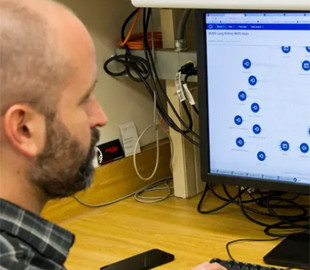AI was taught to predict human lifespan: how did it work?


Modern technology based on artificial intelligence makes it possible to determine a person's biological age and potential life expectancy with high accuracy, taking into account the risks associated with age-related diseases.
A group of scientists from the Institute of Psychiatry, Psychology and Neuroscience at King's College London has developed an innovative method that allows you to estimate biological age and life expectancy based on a blood test, Channel 24 reports with reference to Science Advances.
New research on aging
Researchers analyzed data from more than 225,000 biobank participants and trained 17 artificial intelligence models to analyze metabolites – molecules arising in the process of metabolism.
Metabolites are actively formed in the aging process: some of them can accelerate this process, while others, on the contrary, contribute to its slowing down.
The study found that people with accelerated aging, whose biological age exceeds their passport age, are more likely to face chronic diseases and have an increased risk of death. They were also found to have shorter telomeres.
Telomeres are protective structures at the ends of chromosomes that play a key role in maintaining the integrity of our DNA. There is evidence that their shortening is a marker of aging and may indicate a decrease in cell functionality, which increases the likelihood of developing age-related diseases.
Artificial intelligence has been taught to predict life expectancy
Scientists have developed a new method for assessing biological age using the so-called “aging clocks”, which operate based on the analysis of metabolites (substances involved in metabolism).
Traditional methods of measuring age have proven to be inaccurate and do not take into account the complex relationships between different metabolites in the body. The new approach uses AI to detect indirect links between metabolites and age.
The metabolic clock of aging can detect early signs of health decline and predict an individual's approximate lifespan. It also allows people to make more informed decisions about their lifestyle, said lead author Dr. Julian Mutz.
This research opens up new horizons for understanding aging processes and developing effective strategies to extend life.
Recent Posts
Fraudsters cheated on a 28-year-old man who wanted to buy a car from abroad on the Internet
< img src = "/uploads/blogs/e0/f0/ib-frfb994i6_4ca8c299.jpg" Alt = "fraudsters were shocked by a 28-year-old man who…
How can I check Instagram page on fraud
< img src = "/uploads/blogs/1f/e6/ib-frg21tg5u_f4a4999ea.jpg" Alt = "How to check Instagram page for fraud"/> ~…
Karol Nawrocki's staff shared a photo and it began. There is a pretty of legal steps and sharp accusations
A sharp reaction after the publication of photos of Rafał Trzaskowski by the Chief of…
The backstage of Kaczyński's interrogation was revealed. Unknown details leaked
What the interrogation looked like ? < img src = "https://zycie.news/crrops/aed71c/620x0/1/0/2025/04/04/ugu6hvhaktyskjwpmojwwa8Ugqmoqujregy65v3.jpg" alt = "Jarosław Kaczyński,…
Maciej Pela received the award. Agnieszka Kaczorowska would not be happy with the speech that Agnieszka Kaczorowska gave
Maciej Pela received the prize and stuck a heel of Agnieszka Kaczorowska. < img src…
Put bay leaves by the window. A simple trick for a persistent problem
A natural way for a troublesome problem. < img src = "https://zycie.news/crrops/031187/620x0/1/0/2025/04/04/slc84nqmz1acgdrmtvv1idr98cgiuzft5km5kirp.png" alt = "bay…